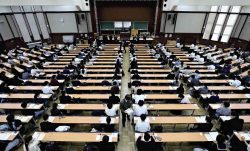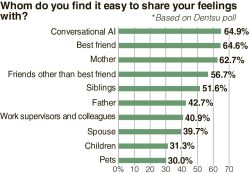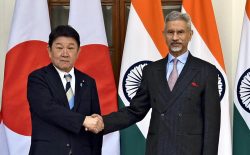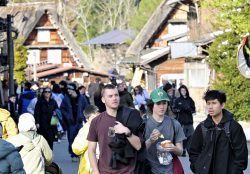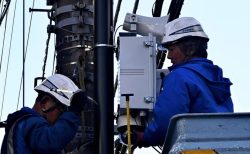
Relatives of Palestinians who were killed in the Israel-Gaza war attend funeral preparations outside the Nasser Medical Hospital in Khan Younis on Tuesday.
14:46 JST, November 16, 2023
The 30-year-old is exhausted, hungry and sick from drinking dirty water. For a month now, she has been sleeping on a sheet on a hard classroom floor with more than 80 other women and children, she told The Washington Post by phone. The men and older boys sleep outside in the courtyard of what was formerly a school run by UNRWA, the U.N. agency for Palestinian refugees, in the southern Gazan city of Rafah.
Dirt cakes every surface and crevice, she said. There’s no water for washing up. Navigating a bathroom in such close quarters is a nightmare for women in this socially conservative society. To cope, some go to the bathroom only once a day, they told The Post.
Tarabin had Caesarean sections for her first two children and fears having to endure a third in these conditions, possibly without hard-to-find anesthesia – that is, she said, if she even makes it through the next month.
“I am afraid I will die before the baby is born,” she said.
Across central and southern Gaza, U.N. facilities, family homes and makeshift camps are overflowing with some of the 1.5 million Gazans displaced by Israel’s war against Hamas militants. Thousands more families continue to pour in daily from the besieged north, where Israeli forces are steadily advancing.
After five weeks of intense bombardment and a near-total siege, electricity is almost nonexistent. There is not enough food to go around, and no regular access to clean water or basic sanitation. Airstrikes continue to kill and maim people in what the Israeli military has described as “safer areas” in the south.
The weight of war and displacement is especially hard to bear for Gazan women and girls.
Noura Atta, 47, and her five daughters sleep in the same cement room as Tarabin. They survive off small portions of cheese and bread that UNRWA provides. As winter approaches, they burn fabric for warmth some nights.
Menstrual cycles have become a constant stress.
UNRWA distributes sanitary pads at the school – but not nearly enough, Atta said. She’s taken to cutting up dirty cloths for her daughters. Without water or privacy, they have no way to clean themselves or their underwear.
“I cannot bear my girls’ tears and pain when they get their period,” Atta said. “I do not know how to alleviate their burden.”
Nahid Abdel Hamid, 26, a mother of three, sleeps nearby. She has started to take birth control to prevent her from getting her period. Other women at the school provided the pills, she said.
She worries about negative side effects, but is grateful. “They have provided a safe space to spare myself from exposure to the lack of hygiene here,” she said.
Nadia Abdel Nabi, 14, stays in the same room. She just had her period for the second time, surrounded by strangers. She’s confused by what’s happening to her body, she told The Post by phone, sharing her story with her family’s consent.
“I feel an urgent need for my mother to always be my side,” she said.
“I wish I could return to our house,” she added, though she thinks it has been destroyed or damaged in the fighting. “I am incredibly tired.”
Israel’s fifth war with Hamas erupted on Oct. 7 after the militant group’s assault on southern Israel, in which fighters killed some 1,200 people and took more than 230 hostages.
More than 11,100 Palestinians have been killed in the weeks since, according to Gaza’s Health Ministry, which said Friday that it could no longer provide updated figures, citing damage to communications infrastructure and the intensity of the fighting.
Even before the war, the small, tightly packed coastal enclave faced numerous compounding economic and health crises after 16 years under an Israeli-led blockade. Hamas, the U.S.-designated terrorist group that runs the strip, imposed an extreme form of Islamist rule that restricted women’s rights.
UNRWA has tried to address “overcrowding and the particular challenges for women and girls,” spokeswoman Tamara Alrifai told The Post. Across U.N. facilities, women and young children sleep in one section and men in another to adhere to social codes and guard against harassment.
But the numbers are staggering. Some 778,000 Gazans are sheltering in at least 154 UNRWA sites, the majority in the center and south, the agency said.
So far, Alrifai said, UNRWA has not seen a rise in gender-based violence, but she expects that to change: “Both sexual harassment and domestic violence tend to increase in prolonged periods of displacement.”
The humanitarian aid that has trickled into Gaza – described by the U.N. secretary general as “completely inadequate” – has included just two trucks containing supplies for baby deliveries and Caesarean sections, according to the U.N. family and planning agency. UNFPA estimates there are about 50,000 pregnant women in Gaza, and 5,500 of them are due to give birth over the next month – amounting to more than 180 births a day.
Fatima Hamed’s 25-year-old daughter is five months pregnant. On Tuesday, she was trying to find a tarp for her, to offer some measure of privacy and protection.
“We lack the minimum requirements for life – neither water nor food,” Hamed, 55, told The Post by phone from Rafah. “We postpone getting food until the evening hours so that we do not have to go to the bathroom, and so that we do not go to bed hungry.”
Five days into the war, a strike hit Hamed’s house in Beit Hanoun, in northeast Gaza. The family of 12 fled first to a UNRWA school in Deir al-Balah, part of the area that Israel has urged civilians to go to for safety. When strikes hit neighboring houses, she said, they fled again.
The family made it to Rafah, finding shelter in a small government-run school that does not provide food or aid. When it rained on Monday, the men slept outside while the women and children crowded together in a classroom.
She and her daughter spent the night worrying about losing the baby.
“We now live in the Stone Age,” Hamed said. “Whoever does not die by murder will die of hunger, disease, fear and pollution.”
"News Services" POPULAR ARTICLE
-

Japan’s Princess Kako Marks 31st Birthday, Contributed to Key Events This Year
-

Arctic Sees Unprecedented Heat as Climate Impacts Cascade
-

Brigitte Bardot, 1960s Sultry sex Symbol Turned Militant Animal Rights Activist Dies at 91
-
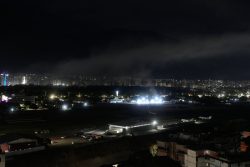
At Least 7 Explosions and Low-Flying Aircraft Are Heard in Venezuela’s Caracas
-

South Korea Prosecutor Seeks Death Penalty for Ex-President Yoon over Martial Law (Update)
JN ACCESS RANKING
-

Japan Govt Adopts Measures to Curb Mega Solar Power Plant Projects Amid Environmental Concerns
-

Core Inflation in Tokyo Slows in December but Stays above BOJ Target
-

Major Japan Firms’ Average Winter Bonus Tops ¥1 Mil.
-

Tokyo Zoo Wolf Believed to Have Used Vegetation Growing on Wall to Climb, Escape; Animal Living Happily after Recapture
-

JAL, ANA Cancel Flights During 3-day Holiday Weekend due to Blizzard








